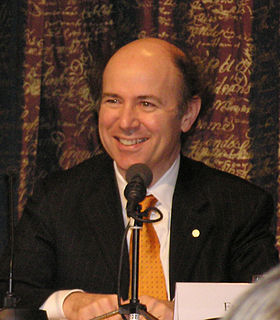A Quote by Brigham Young
Our religion will not clash with nor contradict the facts of science in any particular.
Quote Topics
Related Quotes
In these respects we differ from the Christian world, for our religion will not clash with or contradict the facts of science in any particular... whether the Lord found the earth empty and void, whether he made it out of nothing or out of the rude elements; or whether he made it in six days or in as many millions of years, is and will remain a matter of speculation in the minds of men unless he give revelation on the subject. If we understood the process of creation there would be no mystery about it, it would be all reasonable and plain, for there is no mystery except to the ignorant.
Belief Systems contradict both science and ordinary "common sense." B.S. contradicts science, because it claims certitude and science can never achieve certitude: it can only say, "This model"- or theory, or interpretation of the data- "fits more of the facts known at this date than any rival model." We can never know if the model will fit the facts that might come to light in the next millennium or even in the next week.
I firmly believe that the method which sets theological theories against scientifically ascertained facts, is fatal to the current theology and injurious to the spirit of religion; and that the method which frankly recognizes the facts of life, and appreciates the spirit of the scientists whose patient and assiduous endeavor has brought those facts to light, will commend the spirit of religion to the new generation, and will benefit--not impair--theology as a science, by compelling its reconstruction.
What's true will never contradict what's true. Article 2 of the Belgic Confession, based on Psalm 19, Romans 1, and several other texts, declares that God has given us two reliable revelations: the words of Scripture and the facts of nature. Thus, it would be impossible for the facts of nature ever to contradict the words of the Bible.
This much I can say with definiteness - namely, that there is no scientific basis for the denial of religion - nor is there in my judgment any excuse for a conflict between science and religion, for their fields are entirely different. Men who know very little of science and men who know very little of religion do indeed get to quarreling, and the onlookers imagine that there is a conflict between science and religion, whereas the conflict is only between two different species of ignorance.
Any attempt to speak without speaking any particular language is not more hopeless than the attempt to have a religion that shall be no religion in particular.... Every living and healthy religion has a marked idiosyncrasy. Its power consists in its special and surprising message and the bias which that revelation gives to life.
The essence of religion is inertia; the essence of science is change. It is the function of the one to preserve, it is the function of the other to improve. If, as in Egypt, they are firmly chained together, either science will advance, in which case the religion will be altered, or the religion will preserve its purity, and science will congeal.
We don't have a great clash of civilizations, a clash of ideologies, a clash of alternative models, where governments thought to themselves, if we go too far, if we sort of trample unreasonably on rights, we'll give birth to a political movement which will cost us our credibility, and will possibly cost us our offices, because people will vote for the other team, the other guys.
No theory ever agrees with all the facts in its domain, yet it is not always the theory that is to blame. Facts are constituted by older ideologies, and a clash between facts and theories may be proof of progress. It is also a first step in our attempt to find the principles implicit in familiar observational notions.
My interests drew me in different directions. On the one hand I was powerfully attracted by science, with its truths based on facts; on the other hand I was fascinated by everything to do with comparative religion. [...] In science I missed the factor of meaning; and in religion, that of empiricism.








































